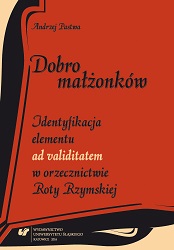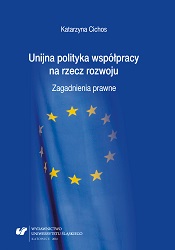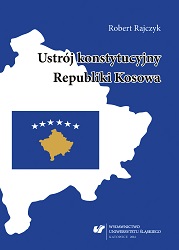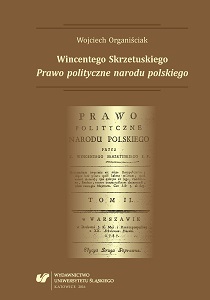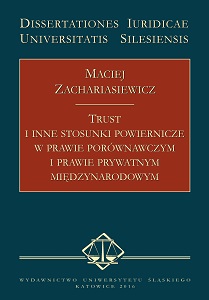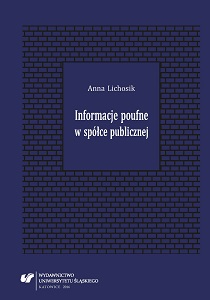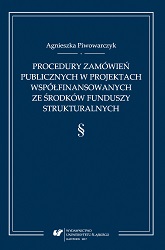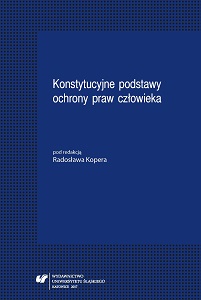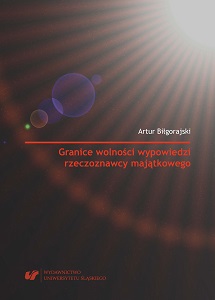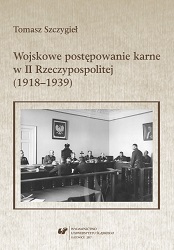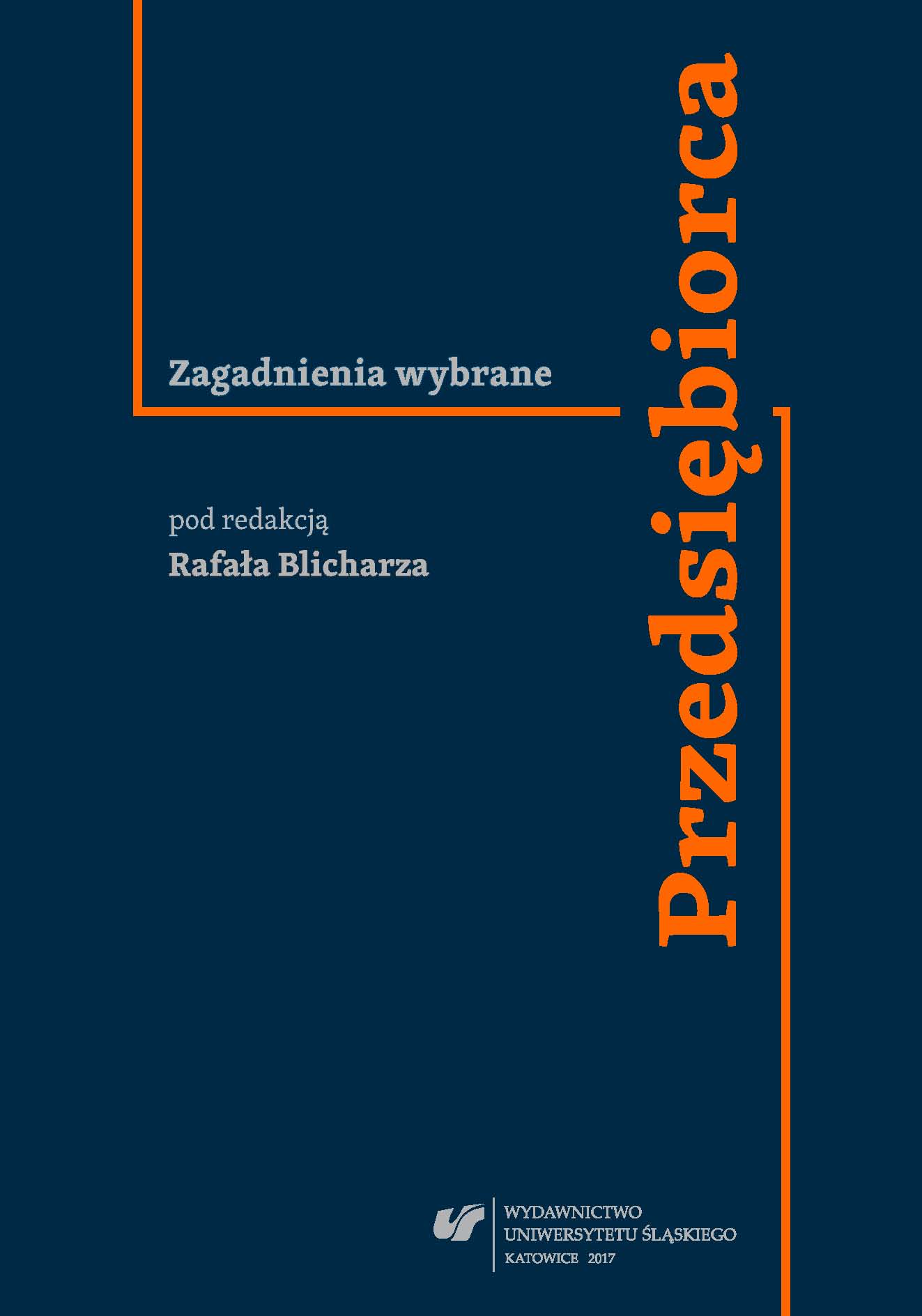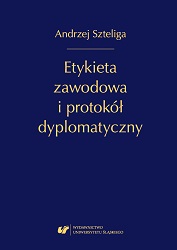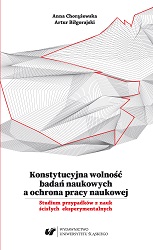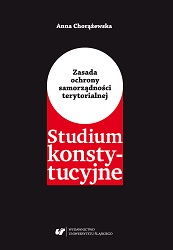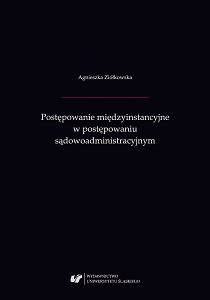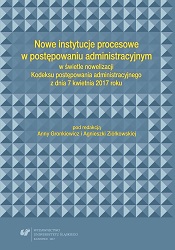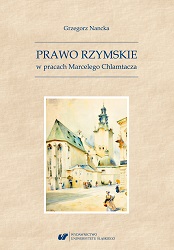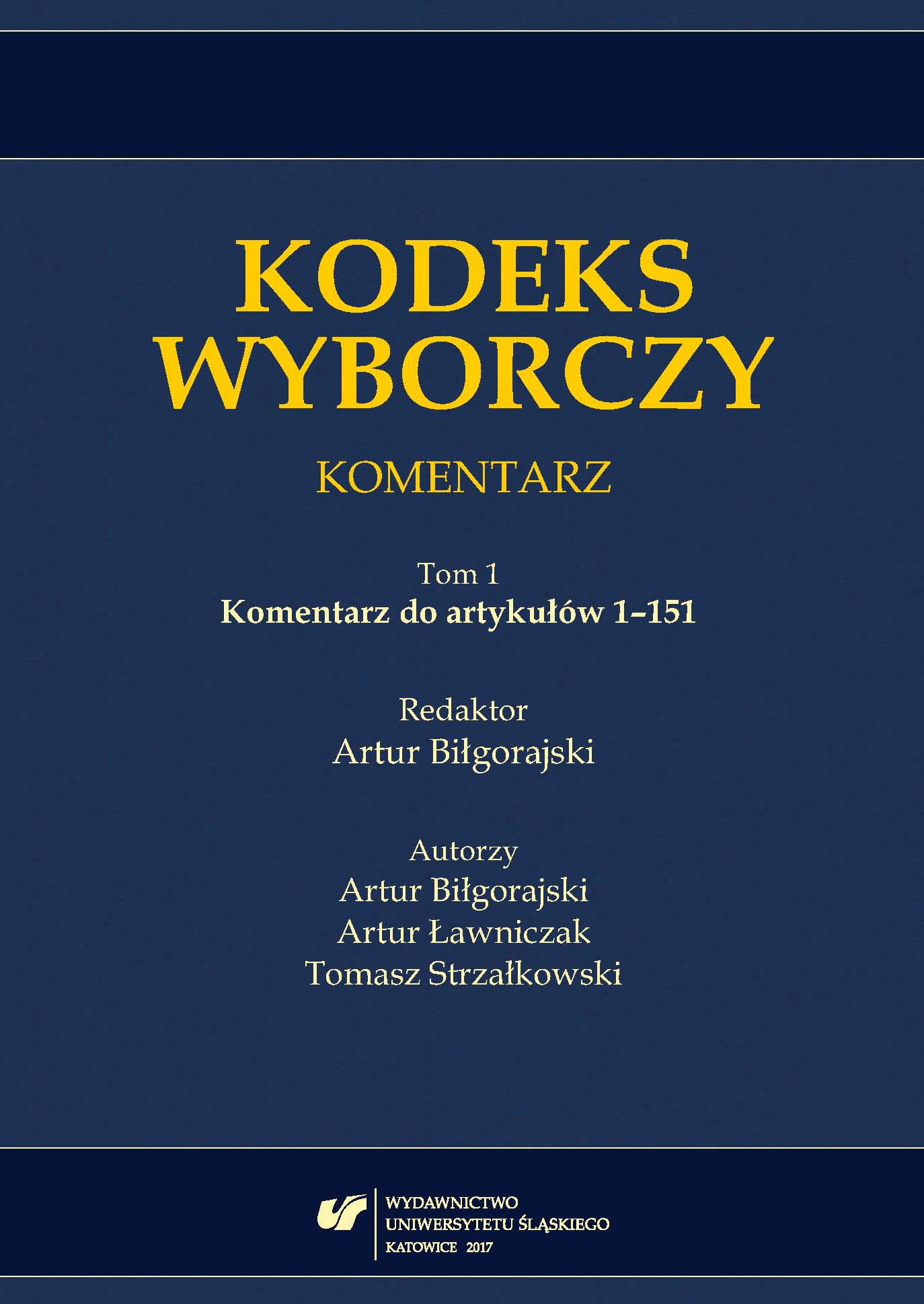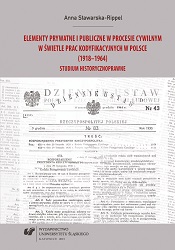
Private and public aspects in the civil procedure in the light of works on the codification in Poland (1918–1964). A legal-historical study
Elementy prywatne i publiczne w procesie cywilnym w świetle prac kodyfikacyjnych w Polsce (1918–1964). Studium historycznoprawne
Keywords: civil procedure; Second Polish Republic; Polish People’s Republic; the evolution of the civil procedure; comparative; Soviet law; codification; private aspects; public aspects; Codification Committee
The past century in Poland had witnessed significant regime changes which resulted in the subsequent codification, decodification and recodification of the law, which, as far as the civil procedure is concerned – following substantial changes resulting from the third political transformation in the 20th century – has remained in effect until the present day. The following monograph is devoted to the history of codification of the Polish civil procedure, mapped against the backdrop of the evolution of this particular branch of law in Europe and the subsequent “revolution” in Poland, following the Second World War, taking into account its patterns as well as its reach in the remaining countries governed by people’s democracy. The author considers the topic from the perspective of the private and public aspects of the civil procedure, which have a profound impact on the shape and content of the Code of Civil Procedure. The monograph touches upon the works on the codification that were attempted twice in the history of the Polish civil procedure and discusses the model of civil litigation with the focus on the aspect of delineating the relationship between the individual and the state. // The two main chapters of the monograph have been preceded by comprehensive introductions, which provide the legal-historical, comparative, and theoretical background for the primary argument. In those parts of the monograph, the author discusses the evolution of the civil procedure in Western Europe in the 19th and 20th century, the specifics of the peculiar socialist civil procedure, as well as the means of recourse against judgments in the civil proceedings in the context of the interests of both the state and the individual. // In the discussion concerning the processes undertaken even before the creation of the Codification Committee in 1919, the author conducts a comparative legal analysis of the problem of the principal rules of the civil procedure as well as minute details which have fundamental bearing on the model of the Code of Civil Procedure. The following argument focuses on the efforts of the Codification Committee, unprecedented both in Europe and the entire world. At that time, the primary goal of the government was integration of the Polish lands, divided by partitions and restoration of the Polish sovereignty. As a result of the efforts of the Codification Committee of the Second Polish Republic, the first Polish Code of Civil Procedure was created (1930); this original work, the fruit of long-term efforts of the most distinguished Polish legal experts, was, in fact, an in-depth comparative study. The interwar codifiers analysed not only the civil procedures in force in Poland: Russian (1864), German (1877), Austrian (1895) and Hungarian (1911), but also the most significant civil procedures in Europe, including the civil procedure of the Swiss cantons of Zurich (1913) and Bern (1918), as well as the civil procedure of Italy (1865), Greece (1834) and, in part, England (1873–1873), despite its relative lack of significance due to the fundamental differences between the common law and the continental law. The first drafts of Code of the Civil Procedure were distinctive due to their attempts to include a fair number of the public aspects in the civil proceedings, which was also characteristic of the evolution of the civil procedure in Europe at that time and was intended as a remedy for the shortcomings of the civil jurisdiction. However, the final draft of the Code did not include several pioneering, innovative concepts which concerned preparatory proceedings, abuse of rules of procedure clause, obligation of truthfulness, the discretional power of the judge, evidence proceedings, as well as the construction of an obligatory replay to the statement of claim and default judgment. Several other significant changes, which severely misrepresented the initial intentions of the codifiers, were implemented at the governmental stage of development. The omission of the proposed institutions was caused by the desire to preserve the golden mean, which was modelled after the Austrian civil procedure to an extent. On the other hand, the governmental changes were characterised by the urge to make the first Polish Code of Civil Procedure more similar to the Russian legislation, which resulted from the pressure and protests of the lawyers coming from the former Congress Poland. // The necessity of making the civil procedure more flexible as well as making their forms more simple and the amount of regulation more reasonable, along with various other problems discussed within the framework of the civil procedural law by the Codification Committee of the Second Polish Republic, is discussed until this day, in the context of numerous changes following the political transformation and the necessity of drafting a new – third – Code of Civil Procedure. // The preservation of formal but at the same time critical and selective legal continuity in the first years of the Polish People’s Republic resulted in the necessity of revision of the inherited law and restructuring of its tenets to reflect the socialist agenda. Implementation of the Soviet ideas of difference and protection of property as well as planned economy resulted in weakening of the civil procedural law and the increased importance of the administrative law. In this context, the monograph touches upon the problems of that time, concerning restrictions on the civil procedure (non-litigious proceedings, state arbitration). The transformation of the political and legal system in countries governed by people’s democracy resulted in significant and forced unification of adjective law. This involuntary unification was conducted in a very short time. The situation was similar in the USSR, where, on the basis of the authority of the Soviet Union with regard to establishing the foundations of the judicial system and legal proceedings, as well as the civil and penal law–introduced by the resolution of the Supreme Soviet of the Soviet Union of February 11th, 1957–the law was unified in all the federal republics, according to the USSR legislation. // The circumstances surrounding the drafting of the Polish Act of July 20th, 1950 and its content, which constituted, in fact, decodification of the civil procedure, have been discussed in comparison with the changes taking place in the civil procedure in Czechoslovakia, Bulgaria and Hungary at that time. The draft of the new code proposed by the Department of Justice (1955) further eroded the first Polish Code of Civil Procedure; however, ultimately, the project was not implemented. // Following the establishment of the Codification Committee in 1956, the codification efforts were characterised by relative leniency caused by comparative liberalisation connected with the change in the political climate (1956), and strictly substantial discussion based on comparative analysis that transcended the boundaries of the socialist law and thoroughly discussed the essence of the civil procedure in the light of its development. The effect of those proceedings was a satisfactory first draft of the new code (1960), which had hallmarks of evolution. This draft was later subject to changes in the second draft and later in the governmental and parliamentary stages of the codification work, until finally the second Polish Code of Civil Procedure (1964) was passed, in accordance with the political principles of the time. // The chapter devoted to the private and public aspects in the system of recourse against judgments, the author discusses the problem of the character of the appeal and the character of the third instance made by the Codification Committee of the Second Polish Republic. Next, in the context of the Soviet model and the new legal regulations in Czechoslovakia, Hungary, Bulgaria and East Germany, the author discusses the issues of the appeal and the extraordinary appeal against a final judgment as well as the possibility of challenging judgments in force by the state authority in the Polish People’s Republic starting with the amendment of July 20th, 1950, through the drafts of the Code of Civil Procedure, their critique and implemented changes, to the passing of the Code (1964). // The history of codification of the civil procedure in the Second Polish Republic and Polish People’s Republic, regardless of the motivation, illustrates the phenomenon in which the final draft of the act differs significantly–usually for the worse–from the initial premises and conceptions established by the experts who worked on the first draft for a prolonged period of time.
More...
